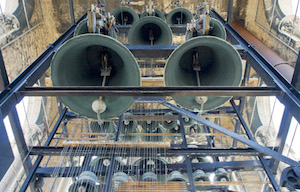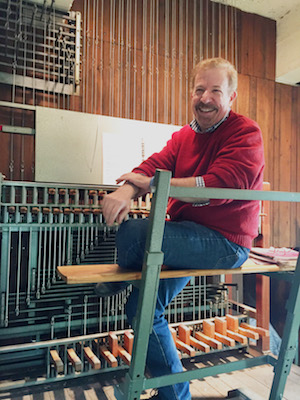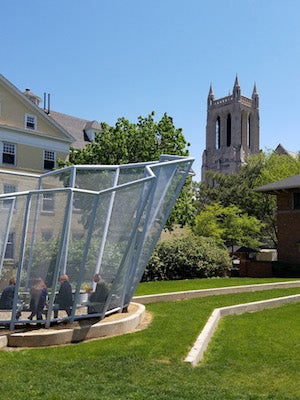CONNECT Reflect
Providing a Campus Soundtrack
McGaffin Carillon's Pealing Bells Mark 50 Years
 PHOTO: Nancy Hribar Matz
PHOTO: Nancy Hribar MatzThe bells of the Alexander McGaffin Carillon.
Starting in his junior year at Case Western Reserve University, George Leggiero lived in Mather House next to the Church of the Covenant, which rang its 47 carillon bells daily on the quarter hour.
"You either learned to love the bells or you moved," he said.
Leggiero (CIT '72; GRS '77, music) stayed. And decades later, he's still enamored.
 PHOTO: Denise Horstman
PHOTO: Denise HorstmanGeorge Leggiero, who has been the carillonneur at the Church of the Covenant since 1973.
Since 1973, Leggiero has been the carillonneur at the church's Alexander McGaffin Carillon, playing the instrument before and after Sunday services and for Friday lunchtime concerts. By day, he helps maintain online services at Kent State University's library system.
This year, the carillon marks 50 years of providing an eclectic soundtrack for the University Circle community.
Weighing about 15,000 pounds, the instrument has a range of four octaves, sits in the top of a 140-foot-high tower and is controlled by levers and pedals from a room below the bells, which were forged in the Netherlands. The carillon is one of only about 185 carillons with cast bells (as opposed to electronic systems) in North America. It's named for Alexander McGaffin, the minister who, in the early 1900s, pushed for the tower to be included in the Euclid Avenue church's design.
 PHOTO: Denise Horstman
PHOTO: Denise HorstmanThe tower housing the carillon seen from the Case Western Reserve campus.
Today, Leggiero plays a wide variety of tunes, from religious to pop, and a mix of music composed for the carillon. His audience includes the university community and people across the street at University Hospitals Cleveland Medical Center.
"It sort of creates a campus atmosphere to hear the bells," he said. "But there are also patients, and even families, who find it a comfort to hear something being played on the carillon, or you play a tune that makes them smile."





